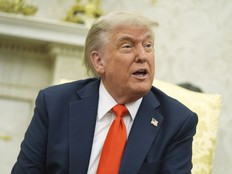Jonah Goldberg
LATEST STORIES BY JONAH GOLDBERG
GOLDBERG: Kamala Harris won't cure what's ailing the Democratic Party
William Henry Harrison, the ninth president of the United States, was the last commander in chief born a British subject and the first member of the Whig Party to win the White House. He delivered the longest inaugural address in history, nearly two hours, and had the shortest presidency, being the first sitting president to die in office, just 31 days into his term.

JONAH GOLDBERG: Yes, Mr. President, they're still talking about Jeffrey Epstein
“Are you still talking about Jeffrey Epstein?” U.S. President Donald Trump shot back at a reporter during a Cabinet meeting. “This guy’s been talked about for years. … I mean, I can’t believe you’re asking a question on Epstein at a time like this, where we’re having some of the greatest success and also tragedy with what happened in Texas. It just seems like a desecration.”

GOLDBERG: Was bombing Iran deja vu all over again?
After a short and successful war with Iraq, President George H.W. Bush claimed in 1991 that “the ghosts of Vietnam have been laid to rest beneath the sands of the Arabian desert.” Bush was referring to what was commonly called the “Vietnam syndrome.” The idea was that the Vietnam War had so scarred the American psyche that we forever lost confidence in American power.

GOLDBERG: Maybe Democratic disarray means they're coming to their senses
Randi Weingarten, head of the American Federation of Teachers, and Lee Saunders, president of the American Federation of State, County and Municipal Employees, resigned from their positions on the Democratic National Committee. This could be great news.

GOLDBERG: Trump deploys, protesters respond. This will not end well
“Here we go.”

JONAH GOLDBERG: Trump shows that loyalty is all that matters to him
Last week, the Court of International Trade delivered a blow to Donald Trump’s global trade war. It found that the worldwide tariffs Trump unveiled on “Liberation Day” as well his earlier tariffs pretextually aimed at stopping fentanyl coming in from Mexico and Canada (as if) were beyond his authority. The three-judge panel was surely right about the Liberation Day tariffs and probably right about the fentanyl tariffs, but there’s a better case that, while bad policy, the fentanyl tariffs were not unlawful.

GOLDBERG: History should have made more reporters skeptical about Biden's health
Hundreds of thousands of photos were taken of Franklin Delano Roosevelt. And yet, there are only four known photos of him in a wheelchair. This was deliberate. FDR hid his disability from polio — even from his mother. He ordered the Secret Service to destroy images of him in a wheelchair. His doctor, recommended by the physician who’d helped keep the severity of President Woodrow Wilson’s stroke hidden from public view, was chosen for similar discretion. Roosevelt even successfully enlisted the press corps in what author and international disability advocate Hugh Gallagher called FDR’s “splendid deception.” It was easy to rationalize the decision. Between the Great Depression and the Second World War, journalists felt that they should go along with the effort to portray the president as physically up to the job, for the sake of American morale. These are just the most egregious examples of this kind of obfuscation. But there were others. Grover Cleveland had a tumour removed on what the White House claimed was a “fishing trip.” The severity of Dwight D. Eisenhower’s heart attack in 1955 was downplayed to not jeopardize his re-election. JFK suffered from Addison’s disease and was “treated” by his personal physician, “Miracle Max” Jacobson, a.k.a. Dr. Feelgood, who gave him “vitamin” shots loaded with amphetamine and methamphetamine. The public had no idea until a New York Times report in 1972. In other words, the controversy over Joe Biden’s infirmity — and now his just-revealed Stage 4 prostate cancer — is not nearly so new as it may seem. That controversy, reignited by the publication of Original Sin: President Biden’s Decline, Its Cover-Up, and His Disastrous Choice to Run Again, by Jake Tapper and Alex Thompson, was dominating the political conversation until the Biden family released news of his cancer. According to Tapper (an anchor at CNN, where I am a contributor) and Thompson (a reporter for Axios), Biden, his family and his closest aides conspired to hide the extent of Biden’s mental and physical decline from the public. Motivations varied, as they often do, from an intense partisan desire to keep Donald Trump from retaking the White House, to Biden’s denial and vanity, to a desire by his closest aides to stay in power. As one high-level aide told the authors, “He just had to win, and then he could disappear for four years — he’d only have to show proof of life every once in a while.” Suspicions that the cancer revelation is an extension of Team Biden’s desire to control the narrative over his health are hard to avoid. David Axelrod, a Democratic strategist and power broker who was very vocal about the political problems presented by Biden’s age, had the kind of reaction the Biden team probably hoped for. “Those conversations (about Biden’s infirmity and the effort to conceal it) will happen, but they should be more muted and set aside for now as he’s struggling through this.” It’s hard to gainsay the spirit of Axelrod’s compassion. There’s no call for the viciousness some have spewed in response to an 82-year-old grandfather and husband’s cancer diagnosis. But skepticism is warranted all the same, even if it comes from partisans. As many doctors — including oncologist Zeke Emmanuel, a former Biden administration medical adviser — have noted, prostate cancer is very slow-moving. It is surprising that a two-term vice-president and one-term president could have so many high-profile medical exams without it being caught before now. Whatever the truth, history — both Biden’s and that of the presidency — make asking unpleasant questions legitimate. One of the obvious and much-discussed lessons from this chapter is that the news media should indulge their skepticism of those in power a lot more, particularly when doing so is politically or ideologically undesirable. For many Republicans, reporters’ relative lack of curiosity about Biden’s health and acuity can be explained entirely by the partisanship of journalists who, fearful of a Trump restoration, hid the truth. Less discussed, however, is that partisanship can be a useful tool in exposing the truth as well. Axelrod didn’t push for removing Biden from the 2024 ticket because he’s a Republican. He’s a partisan Democrat who found it necessary to tell the truth for the sake of the party’s chances of winning. Similarly, the right’s response to Original Sin and its revelations hasn’t been one of shock but of “we told you so.” Highlighting Biden’s infirmity suited their partisan ends, but that doesn’t mean it wasn’t true. Many in the media forgot that partisanship is often one of the only things that can motivate people to give voice to unpleasant truths.


